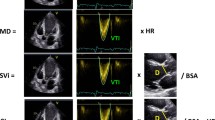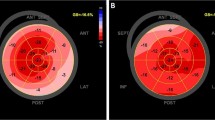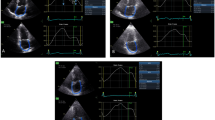Abstract
Controversial data exist about the long-term results of aortic coarctation (AC) repair. This study explored the prevalence and predictors of left ventricular (LV) hypertrophy, late hypertension, and hypertensive response to exercise in 48 subjects (age, 15.1 ± 9.7 years) currently followed in the authors’ tertiary care hospital after successful AC repair. Data on medical history, clinical examination, rest and exercise echocardiography, and ambulatory blood pressure monitoring were collected. The time from AC repair to follow-up evaluation was 12.9 ± 9.2 years. The prevalence of LV hypertrophy ranged from 23 to 38 %, based on the criteria used to identify LV hypertrophy, and that of concentric geometry was 17 %. One sixth of the patients without residual hypertension experienced late-onset hypertension. One fourth of those who remained normotensive without medication showed a hypertensive response to exercise. Age at AC repair was the strongest independent predictor of LV hypertrophy, defined using indexation either for body surface area (odds ratio [OR], 1.03; p = 0.0090) or for height2.7 (OR 1.02; p = 0.029), and it was the only predictor of late hypertension (OR 1.06; p = 0.0023) and hypertensive response to exercise (OR 1.09; p = 0.029). The risk of LV hypertrophy was 25 % for repair at the age of 3.4 years but rose to 50 and 75 % for repair at the ages of 5.9 and 8.4 years, respectively. Similar increases were found for the risk of late-onset hypertension and hypertensive response to exercise. A considerable risk of LV hypertrophy, late hypertension, and hypertensive response to exercise exists after successful AC repair. Older age at intervention is the most important predictor of these complications.

Similar content being viewed by others
References
Baumgartner H, Bonhoeffer P, De Groot NM et al (2010) ESC Guidelines for the management of grown-up congenital heart disease (new version 2010). Eur Heart J 31:2915–2957
Bouchart F, Dubar A, Tabley A, Litzler PY, Haas-Hubscher C, Redonnet M et al (2000) Coarctation of the aorta in adults: surgical results and long-term follow-up. Ann Thorac Surg 70:1483–1488
Brouwer RM, Erasmus ME, Ebels T, Eijgelaar A (1994) Influence of age on survival, late hypertension, and recoarctation in elective aortic coarctation repair: including long-term results after elective aortic coarctation repair with a follow-up from 25 to 44 years. J Thorac Cardiovasc Surg 108:525–531
Campbell R, Fisher JP, Sharman JE, McDonnell BJ, Frenneaux MP (2011) Contribution of nitric oxide to the blood pressure and arterial responses to exercise in humans. J Hum Hypertens 25:262–270
Chakrabarti S, Kenny D, Morgan G, Curtis SL, Hamilton MC, Wilde P et al (2010) Balloon expandable stent implantation for native and recurrent coarctation of the aorta-prospective computed tomography assessment of stent integrity, aneurysm formation and stenosis relief. Heart 96:1212–1216
Clarkson PM, Nicholson MR, Barratt-Boyes BG, Neutze JM, Whitlock RM (1983) Results after repair of coarctation of the aorta beyond infancy: a 10- to 28-year follow-up with particular reference to late systemic hypertension. Am J Cardiol 51:1481–1488
Cohen M, Fuster V, Steele PM, Driscoll D, McGoon DC (1989) Coarctation of the aorta: long-term follow-up and prediction of outcome after surgical correction. Circulation 80:840–845
Cook SC, Ferketich AK, Raman SV (2009) Myocardial ischemia in asymptomatic adults with repaired aortic coarctation. Int J Cardiol 133:95–101
Currie KD, Martin AA, Millar PJ, Stone ND, Timmons BW, Dillenburg RF, Macdonald MJ (2012) Vascular and autonomic function in preschool-aged children with congenital heart disease. Congenit Heart Dis 7:289–297
Cuspidi C, Meani S, Negri F, Giudici V, Valerio C, Sala C et al (2009) Indexation of left ventricular mass to body surface area and height to allometric power of 2.7: is the difference limited to obese hypertensives? J Hum Hypertens 23:728–734
Daniels SR, Meyer RA, Liang YC, Bove KE (1988) Echocardiographically determined left ventricular mass index in normal children, adolescents and young adults. J Am Coll Cardiol 12:703–708
Daniels SR, Loggie JM, Khoury P, Kimball TR (1998) Left ventricular geometry and severe left ventricular hypertrophy in children and adolescents with essential hypertension. Circulation 97:1907–1911
Das BB, Raj S, Shoemaker L (2009) Exercise testing is useful to screen for residual coarctation in children. Pediatr Cardiol 30:763–767
de Divitiis M, Pilla C, Kattenhorn M, Zadinello M, Donald A, Leeson P et al (2001) Vascular dysfunction after repair of coarctation of the aorta: impact of early surgery. Circulation 104:I165–I1170
de Divitiis M, Pilla C, Kattenhorn M, Donald A, Zadinello M, Wallace S et al (2003) Ambulatory blood pressure, left ventricular mass, and conduit artery function late after successful repair of coarctation of the aorta. J Am Coll Cardiol 41:2259–2265
De Simone G, Daniels SR, Devereux RB, Meyer RA, Roman MJ, de Divitiis O et al (1992) Left ventricular mass and body size in normotensive children and adults: assessment of allometric relations and impact of overweight. J Am Coll Cardiol 20:1251–1260
Dilawar M, El Said HG, El-Sisi A, Ahmad Z (2009) Safety and efficacy of low-profile balloons in native coarctation and recoarctation balloon angioplasty for infants. Pediatr Cardiol 30:404–408
Gibbs JL (2000) Treatment options for coarctation of the aorta. Heart 84:11–13
Gillett C, Wong A, Wilson DG, Wolf AR, Martin RP, Kenny D (2011) Underrecognition of elevated blood pressure readings in children after early repair of coarctation of the aorta. Pediatr Cardiol 32:202–205
Godart F (2011) Intravascular stenting for the treatment of coarctation of the aorta in adolescent and adult patients. Arch Cardiovasc Dis 104:627–635
Grøntved A, Brage S, Møller NC, Kristensen PL, Wedderkopp N, Froberg K et al (2010) Hemodynamic variables during exercise in childhood and resting systolic blood pressure levels 6 years later in adolescence: the European youth heart study. J Hum Hypertens 25:575–577 (Epub ahead of print, 11 November)
Ha JW, Juracan EM, Mahoney DW, Oh JK, Shub C, Seward JB et al (2002) Hypertensive response to exercise: a potential cause for new wall motion abnormality in the absence of coronary artery disease. J Am Coll Cardiol 39:323–327
Hager A, Kanz S, Kaemmerer H, Hess J (2008) Exercise capacity and exercise hypertension after surgical repair of isolated aortic coarctation. Am J Cardiol 101:1777–1780
Hauser M, Kuehn A, Wilson N (2000) Abnormal responses for blood pressure in children and adults with surgically corrected aortic coarctation. Cardiol Young 10:353–357
Heger M, Willfort A, Neunteufl T, Rosenhek R, Gabriel H, Wollenek G et al (2005) Vascular dysfunction after coarctation repair is related to the age at surgery. Int J Cardiol 99:295–299
Høimyr H, Christensen TD, Emmertsen K, Johnsen SP, Riis A, Hansen OK et al (2006) Surgical repair of coarctation of the aorta: up to 40 years of follow-up. Eur J Cardiothorac Surg 30:910–916
Kenny D, Hijazi ZM (2011) Coarctation of the aorta: from fetal life to adulthood. Cardiol J 18:487–495
Lam YY, Mullen MJ, Kaya MG, Gatzoulis MA, Li W, Henein MY (2009) Left ventricular long-axis dysfunction in adults with “corrected” aortic coarctation is related to an older age at intervention and increased aortic stiffness. Heart 95:733–739
Lang RM, Bierig M, Devereux RB, Flachskampf FA, Foster E, Pellikka PA, American Society of Echocardiography’s Nomenclature and Standards Committee, Task Force on Chamber Quantification, American College of Cardiology Echocardiography Committee, American Heart Association, European Association of Echocardiography, European Society of Cardiology et al (2006) Recommendations for chamber quantification. Eur J Echocardiogr 7:79–108
Levelt E, Bellenger NG (2009) Complication of aortic coarctation repair surgery. Heart 95:1090
Luijendijk P, Bouma BJ, Vriend JW, Vliegen HW, Groenink M, Mulder BJ (2011) Usefulness of exercise-induced hypertension as predictor of chronic hypertension in adults after operative therapy for aortic isthmic coarctation in childhood. Am J Cardiol 108:435–539
Mancia G, De Backer G, Dominiczak A, Cifkova R, Fagard R, Germano G et al (2007) 2007 Guidelines for the management of arterial hypertension. The task force for the management of arterial hypertension of the european society of hypertension (ESH) and of the European society of cardiology (ESC). Eur Heart J 28:1462–1536
Martins JD, Cabanelas N, Pinto FF (2012) Repair of near-atretic coarctation of the aorta in children with a new low-profile covered stent. Congenit Heart Dis. doi:10.1111/j.1747-0803.2012.00654.x (Epub ahead of print, 12 April)
Matteucci MC, Wühl E, Picca S, Mastrostefano A, Rinelli G, Romano C, ESCAPE Trial Group et al (2006) Left ventricular geometry in children with mild to moderate chronic renal insufficiency. J Am Soc Nephrol 17:218–226
McCandless RT, Puchalski MD, Minich LL, Menon SC (2012) Prenatally diagnosed coarctation: a more sinister disease? Pediatr Cardiol (Epub ahead of print, 11 March)
Moutafi AC, Alissafi T, Chamakou A, Chryssanthopoulos S, Thanopoulos V, Dellos C, et al. (2012) Neurohormonal activity and vascular properties late after aortic coarctation repair. Int J Cardiol 159:211–216
National High Blood Pressure Education Program Working Group on High Blood Pressure in Children and Adolescents (2004) The fourth report on the diagnosis, evaluation, and treatment of high blood pressure in children and adolescents. Pediatrics 114:555–576
Nigro G, Russo V, Rago A, Papa AA, Cioppa ND, Di Meo F, Corcione A, Caianiello G, Russo MG, Calabrò R (2012) Heterogeneity of ventricular repolarization in newborns with severe aortic coarctation. Pediatr Cardiol 33:302–306
Pacileo G, Pisacane C, Russo MG, Crepaz R, Sarubbi B, Tagliamonte E et al (2001) Left ventricular remodeling and mechanics after successful repair of aortic coarctation. Am J Cardiol 87:748–752
Pedersen TA, Munk K, Andersen NH, Lundorf E, Pedersen EB, Hjortdal VE, Emmertsen K (2011) High long-term morbidity in repaired aortic coarctation: weak association with residual arch obstruction. Congenit Heart Dis 6:573–582
Pedersen TA, Røpcke DM, Hjortdal VE (2011) Functional health status late after surgical correction of aortic coarctation. Congenit Heart Dis 6:566–572
Pierdomenico SD, Di Nicola M, Pierdomenico AM, Lapenna D, Cuccurullo F (2011) Cardiovascular risk in subjects with left ventricular concentric remodeling at baseline examination: a meta-analysis. J Hum Hypertens 25:585–591
Roman MJ, Devereux RB, Kramer-Fox R, O’Loughlin J (1989) Two-dimensional echocardiographic aortic root dimensions in normal children and adults. Am J Cardiol 64:507–512
Roselli EE, Qureshi A, Idrees J, Lima B, Greenberg RK, Svensson LG, Pettersson G (2012) Open, hybrid, and endovascular treatment for aortic coarctation and postrepair aneurysm in adolescents and adults. Ann Thorac Surg 94(3):751–758 (Epub ahead of print, 15 June)
Seirafi PA, Warner KG, Geggel RL, Payne DD, Cleveland RJ (1998) Repair of coarctation of the aorta during infancy minimizes the risk of late hypertension. Ann Thorac Surg 66:1378–1382
Soergel M, Kirschstein M, Busch C, Danne T, Gellermann J, Holl R et al (1997) Oscillometric twenty-four-hour ambulatory blood pressure values in healthy children and adolescents: a multicenter trial including 1,141 subjects. J Pediatr 130:178–184
Swartz MF, Atallah-Yunes N, Meagher C, Schiralli MP, Cholette J, Orie J, Gensini F, Kavey RE, Alfieris GM (2011) Surgical strategy for aortic coarctation repair resulting in physiologic arm and leg blood pressures. Congenit Heart Dis 6:583–591
Tan JL, Babu-Narayan SV, Henein MY, Mullen M, Li W (2005) Doppler echocardiographic profile and indexes in the evaluation of aortic coarctation in patients before and after stenting. J Am Coll Cardiol 46:1045–1053
Tang L, Forbes TJ, Du W, Zilberman MV (2009) Echocardiographic evaluation of pressure gradient across the stent in patients treated for coarctation of the aorta. Congenit Heart Dis 4:269–272
Tantengco MV, Ross RD, Humes RA, Sullivan NM, Joshi VM, Clapp SK et al (1997) Enhanced resting left ventricular filling in patients with successful coarctation repair and exercise-induced hypertension. Am Heart J 134:1082–1088
Teo LL, Cannell T, Babu-Narayan SV, Hughes M, Mohiaddin RH (2011) Prevalence of associated cardiovascular abnormalities in 500 patients with aortic coarctation referred for cardiovascular magnetic resonance imaging to a tertiary center. Pediatr Cardiol 32:1120–1127
Thomson JD, Mulpur A, Guerrero R, Nagy Z, Gibbs JL, Watterson KG (2006) Outcome after extended arch repair for aortic coarctation. Heart 92:90–94
Toro-Salazar OH, Steinberger J, Thomas W, Rocchini AP, Carpenter B, Moller JH (2002) Long-term follow-up of patients after coarctation of the aorta repair. Am J Cardiol 89:541–547
Trojnarska O, Szyszka A, Ochotny R, Siwińska A, Cieśliński A (2003) Blood pressure, left ventricular mass, and function in adult patients after successful repair of coarctation of the aorta. Kardiol Pol 59:312–319
Trojnarska O, Gwizdała A, Katarzyńska A, Lanocha M, Katarzyński S, Oko-Sarnowska Z et al (2007) Cardiopulmonary exercise test in the evaluation of exercise capacity, arterial hypertension, and degree of descending aorta stenosis in adults after repair of coarctation of the aorta. Cardiol J 14:76–82
Trojnarska O, Gwizdala A, Lanocha M, Katarzynska A, Katarzynski S, Oko-Sarnowska Z et al (2007) Exercise testing in adults after repair of aortic coarctation: evaluation of cardiopulmonary exercise capacity and B-type natriuretic protein levels. Tex Heart Inst J 34:412–419
Trojnarska O, Szczepaniak-Chicheł L, Mizia-Stec K, Gabriel M, Bartczak A, Grajek S et al (2011) Vascular remodeling in adults after coarctation repair: impact of descending aorta stenosis and age at surgery. Clin Res Cardiol 100:447–455
Turkoz R, Ayabakan C, Yildirim SV (2011) Huge aortic aneurysm after balloon angioplasty for coarctation of the aorta in an infant. Pediatr Cardiol 32:111–112
Vohra HA, Odurny A, Mandal S, Viola N, Kaarne M, Salmon T et al (2010) Giant aneurysms associated with aortic coarctation: management challenges and options. Pediatr Cardiol 31:521–525
von Kodolitsch Y, Aydin MA, Koschyk DH, Loose R, Schalwat I, Karck M et al (2002) Predictors of aneurysmal formation after surgical correction of aortic coarctation. J Am Coll Cardiol 39:617–624
Warnes CA, Williams RG, Bashore TM, Child JS, Connolly HM, Dearani JA et al (2008) ACC/AHA 2008 guidelines for the management of adults with congenital heart disease: a report of the American college of cardiology/American heart association task force on practice guidelines (writing committee to develop guidelines on the management of adults with congenital heart disease). Circulation 118:e714–e833
Wheatley GH 3rd, Koullias GJ, Rodriguez-Lopez JA, Ramaiah VG, Diethrich EB (2010) Is endovascular repair the new gold standard for primary adult coarctation? Eur J Cardiothorac Surg 38:305–310
Author information
Authors and Affiliations
Corresponding author
Rights and permissions
About this article
Cite this article
Bocelli, A., Favilli, S., Pollini, I. et al. Prevalence and Long-Term Predictors of Left Ventricular Hypertrophy, Late Hypertension, and Hypertensive Response to Exercise After Successful Aortic Coarctation Repair. Pediatr Cardiol 34, 620–629 (2013). https://doi.org/10.1007/s00246-012-0508-0
Received:
Accepted:
Published:
Issue Date:
DOI: https://doi.org/10.1007/s00246-012-0508-0




